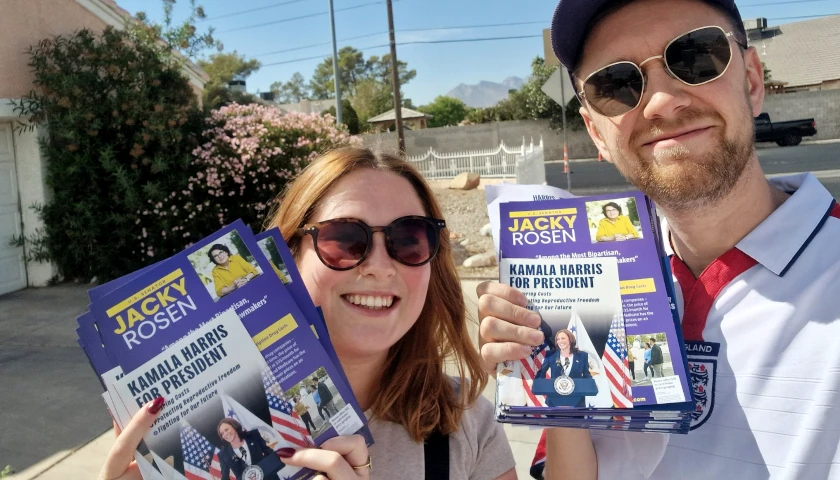Live from Music Row Tuesday morning on The Tennessee Star Report with Michael Patrick Leahy – broadcast on Nashville’s Talk Radio 98.3 and 1510 WLAC weekdays from 5:00 a.m. to 8:00 a.m. – host Leahy welcomed Tennessee Coalition for Open Government’s Executive Director Deborah Fisher to the newsmaker line to comment upon the recent ruling by Judge Russell Perkins to the Tennessee Republican Party to reinstate Robby Starbuck as a GOP candidate for Tennessee’s 5th Congressional District.
Leahy: We are joined right now on our newsmaker line … by our good friend Deborah Fisher. She’s head of the Tennessee Coalition for Open Government. Good morning, Deborah. How are you doing?
Fisher: Good morning, Michael.
Leahy: You have a very interesting article up there about the decision by Judge Russell Perkins, released very late Friday night, about 8:00 p.m., in which he ordered the Tennessee Republican Party to take actions to tell the Tennessee Secretary of State that they should restore Robby Starbuck to the ballot after they disqualified him in a process that began April 11th.
Had an appeal April 19th, which was not in an open-meeting environment, and then communicated to the Secretary of State on April 21st.
You had an interesting take on this about, if this is a violation of the Open Meetings Act, there’s a remedy. Tell us what the remedy would be.
Fisher: Normally a governing body that is found to violate the Open Meetings Act, any action is nullified. But what they can do is, what the courts have said is that the Open Meetings Act was never meant to permanently borrow a governing body from making the decision.
So they can cure that decision. They can cure that decision by simply having another meeting, and doing it with adequate notice as an open meeting to the public. So that would be an option for the Republican Party. But I don’t think that’s the direction they want to take it.
Leahy: Now let me just follow up on the strategy of this. So, they filed an appeal with the Court of Appeals on Monday. The court of appeals then said, okay, Robby Starbuck, you got to get a response by 4:00 p.m. on Tuesday.
What do you think the timeline of that decision from the Court of Appeals is likely to be? And do you think they’ll reverse the lower court decision or not?
Fisher: It’s hard to know, but there is kind of a clock running out here. And I think that the federal judge you mentioned in the earlier case, that the federal judge sort of said Friday is the last day or a deadline, so to speak, when you need to let the election officials know so they can get the ballots ready.
So there is something fast. I don’t know what the court of appeals will do, but they will need to act quickly. The Republican Party says that the meeting that they had was not subject to the Open Meetings Act.
They’ll need to look at the statute and decide whether that’s true or not, whether they think that’s true or not. Certainly the lower court judge thought that it was.
Leahy: Let me follow up on that. Let’s just play out a scenario on this, Deborah. Let’s say that all the decisions are returned by the Court of Appeals by Thursday at 5:00 p.m. I don’t know if this will happen.
In the event that the appeals court reverses the lower court, it would seem to me then that the only recourse Robby Starbuck would have would be to appeal that reversal to the Tennessee Supreme Court. In that situation, do you think the Tennessee Supreme Court would take such an appeal?
Fisher: I don’t know. I mean, clearly the clock has about run out if it’s Thursday, and Starbuck looks like he would be a little bit out of options at that point, simply because of the timing of it. And they have to get the ballots out.
And once they’re down the road, it’s hard to imagine that would happen. But the Supreme Court has taken things up very quickly, in a day, if they think that it is something they need to get involved in, but they might not think that. I mean, it really depends on what the Court of Appeals does.
Leahy: Exactly. Deborah, in-studio with us right now is our lead political reporter, Aaron Gulbransen. Aaron has a question for you.
Gulbransen: I do want to point out and ask your opinion on this. It came out in the court case that Davidson County had already printed their ballots and one other county, and I’m forgetting the name of one other county as well.
So the question is, do you think that squeezes the timeline together, or maybe because they’re already messing with it, kind of expands it a little bit?
Fisher: It’s really hard to say. I mean, this is why this … happening so late in the game here, I think works against Starbuck, because, listen, it is undisputed that a party gets to choose who is the bona fide member of their party.
So you would not want a result in which they did not get to choose that. And I think that the party has a good argument on that front, that they shouldn’t be forced to have someone on the ballot that they don’t think is a bona fide member.
There’s this timeline to kind of right the ship, and they aren’t going to go by, say, a cure meeting, which would be a quick way to do it if they wanted to. They want to get this settled at the Court of Appeals. But I don’t know …
Leahy: Let’s do some more speculation, Deborah, because, you know, what else do we have to do, right? In this scenario? (Laughter) So let me pose this speculative outcome to you.
Let’s say on Tuesday at 5:00, the Court of Appeals says, oh, no, we agree with the chancery court on this, and you need to restore Robby Starbuck to the ballot because it was again, I don’t think this is the case, but let’s just say they made the argument that it was a violation of the Open Meetings Act.
Could the Tennessee Republican Party then, on late Thursday night, put out a notice, hey, we’re going to provide a cure meeting on this issue of Robby Starbuck, his bona fides as a Tennessee Republican, tomorrow, on Friday. Could they do that?
Fisher: I think they could. And that would be the normal way to go about curing an open meetings violation. There’s a little bit more to it, but they could give notice and do that.
Leahy: And again, I don’t know. It seems to me … in terms of timelines, and that would still be before the Friday close-of-business deadline for the publication of the ballot, that might be an outcome that the Tennessee Republican Party might have as their strategy.
Again, I’ve not talked to them about it, but that might be their strategy, if the Court of Appeals makes this decision by Tuesday at 5:00 p.m. What happens if the Court of Appeals makes this decision by, oh, I don’t know, Saturday at 10 a.m.?
Fisher: I don’t think they’ll do that. I think the Court of Appeals, I mean, they took this as an extraordinary appeal, an expedited appeal, and I think they’ll be very aware of the deadlines involved. I don’t think they’ll wait.
Listen to the interview:
– – –
Tune in weekdays from 5:00 – 8:00 a.m. to The Tennessee Star Report with Michael Patrick Leahy on Talk Radio 98.3 FM WLAC 1510. Listen online at iHeart Radio.






To prevail in legal terms over the organization that you seek the opportunity to represent in a general election would appear to be self defeating. Should have kept his powder dry theses races occur every two years.